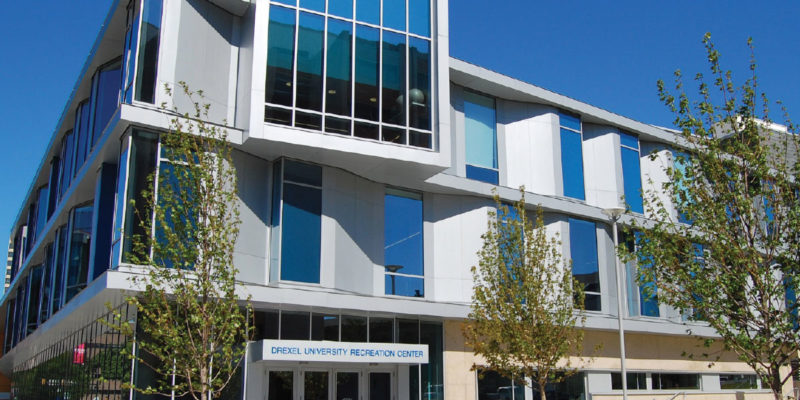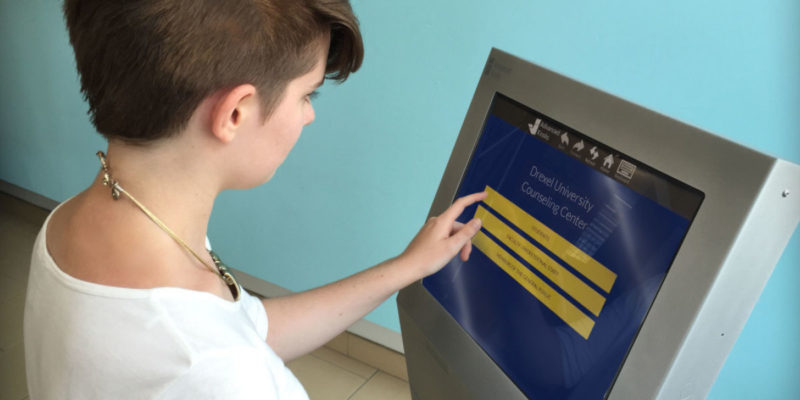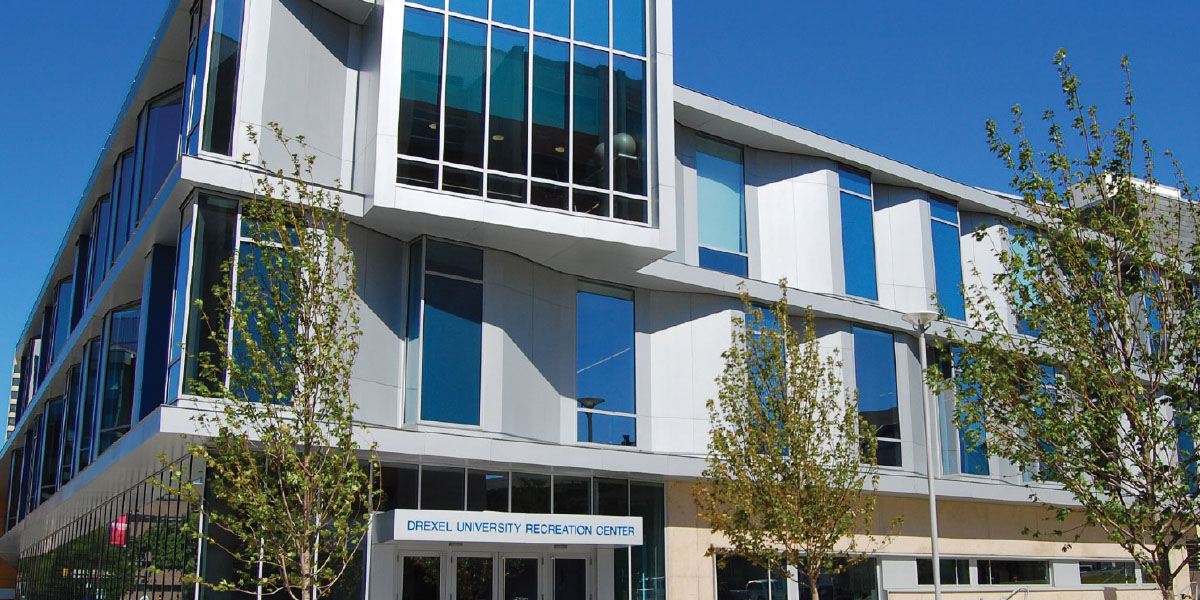Let’s say you’re a college junior whose friends have expressed concerns about your eating or drinking habits. Or maybe you’re a freshman losing sleep over the thought of final exams. How do you know if it’s time to seek professional help?
In just a few minutes, the MindKare Screening Kiosk at Drexel University, Philadelphia, answers that critical question. Based on responses to a self-assessment tool, the software behind the kiosk determines whether the student’s thoughts and behaviors may indicate the presence of a common and treatable mental health issue—and also provides referrals to sources of assistance both on and off campus.
No Stigma
By offering this anonymous and free “check-up from the neck up,” Drexel encourages students to regularly monitor their mental health—even when they’re not in acute distress—and view it as a part of their overall well-being. In fact, we purposely placed the kiosk in the lobby of the campus recreation center, where students typically hang out. It’s an accessible, high-traffic location that exudes a positive energy; the atmosphere positions mental health as a positive attribute as well, rather than something to hide or ignore.

The freestanding kiosk, which requires only an electrical outlet and a Wi-Fi connection, was developed by Screening for Mental Health Inc., a nonprofit organization based in Massachusetts. SMH also developed the questionnaire that pops up on the kiosk’s privacy-protected touch screen.
The questionnaire screens for the issues most likely to be present on a college campus: anxiety, depression, alcohol or substance abuse, eating disorders, body image issues, bipolar disorder, and post-traumatic stress disorder. (It does not screen for attention deficit hyperactive disorder, the clinical diagnosis of which requires documentation of the patient’s developmental history.) The screening tool also helps students determine their resiliency—a “stress-o-meter” of sorts—and provides follow-up resources if needed.
For students who prefer more privacy or greater convenience, the same questionnaire and resources available on the kiosk are also readily accessible online. Both the kiosk and online questionnaires are routed directly to SMH’s encrypted Web portal to preserve anonymity. Drexel does not host the assessment software on its server nor does it collect any protected health information about users, allaying any concerns about HIPAA requirements.
All for the Good
The kiosk made its debut at Drexel in May 2015. As of the end of the winter 2016 term, the number of screenings had grown more than fourfold to 145 per month. As a year-round campus with nearly 20,000 students, we view this tool as a vital component of our overall continuum of care because traditional face-to-face counseling serves only a fraction of the students with mental health concerns.
Students are already comfortable with technology and taking the many “quizzes” that populate the Internet, so the kiosk doesn’t present any usage obstacles. In general, one in three users tends to do the kiosk-based screening, while two out of three prefer the online version.

As we had anticipated, students represent the vast majority of visitors to the kiosk and online portal, with faculty and community members trailing far behind. Students most often select the screening questions for depression and anxiety, with other concerns fluctuating depending on time of year. After its debut, the resiliency questionnaire rapidly emerged as the third most utilized screening tool.
Depression and anxiety also register the highest percentages of users who score positive for symptoms of a disorder. Of those scoring positive for any condition, more than half (59 percent) report that they plan to seek help, whether through formal treatment or their own informal support networks. Because the screening tool is anonymous, however, we are unable to determine how many follow through with that plan.
The beauty of the kiosk is that all members of the campus community are hearing about the counseling center in a positive context—the center isn’t mentioned just in the wake of a student tragedy, as is too often the case on most campuses. Also, parents of current and prospective students appreciate access to the screening tool if their children have concerns.
Like other educational institutions, Drexel has many students who arrive on campus with a history of mental health issues. Among the students who come to our counseling center, for example, about 30 percent have had previous contact with a mental health provider for counseling and/or psychiatric medication. Their families, in particular, find comfort in the university’s proactive approach to identifying and addressing potential mental health issues.
If your campus is considering a kiosk or something similar, here are several suggestions:
- Ensure top leadership is on board. Typically, campus counseling centers operate behind the scenes, so a public initiative such as the kiosk requires high-profile support. Our president, himself the parent of a current Drexel University student, personally champions the mental health needs of our students, both in terms of budgetary priorities and through review of our programs at his leadership council and board of trustees meetings.
- Encourage campus partnerships. Traditionally, negative stereotypes have surrounded counseling on college campuses, with the counseling center often viewed as an entity unto itself. Drexel Counseling counteracts those perceptions by actively pursuing relationships with other units on campus. The marketing department, for example, created a campaign for the screening initiative that we couldn’t have afforded on our own. The campaign generated numerous media inquiries, which in turn led to positive publicity for the university and increased usage of the kiosk. In addition, Drexel’s school of public health is partnering with our counseling center to analyze usage of the screening kiosk.
- Embed mental health in the culture. We frequently give presentations on Drexel’s mental health programs to academic and administrative departments and student groups, always encouraging attendees to pull out their smart phones and see how easy it is to use the screening tool. Because users of the service are disproportionately female—as are those who seek counseling services—we are making an effort to talk to the male-dominated entities on campus, such as fraternities and certain academic majors. And, through a partnership with Drexel’s Active Minds chapter, we attend student activities fairs and study break events to promote both the kiosk and the counseling center’s services.
- Seek outside funding. A grant from the Scattergood Foundation in Philadelphia enabled us to obtain full funding for purchasing the kiosk (which ranges from about $12,000 to $20,000). Other direct expenses, including printing of the resource cards and the annual subscription cost, are covered by our general budget for promoting positive mental health practices. While meeting the mental health needs that come through Drexel’s door, we plan to ramp up our prevention efforts through other initiatives, such as applying for a federal suicide prevention grant specifically intended for college campuses.
SUBMITTED BY Annette Molyneux, associate dean of students and director, student counseling and health; and Paul Furtaw, associate director of counseling services, Drexel University, Philadelphia



